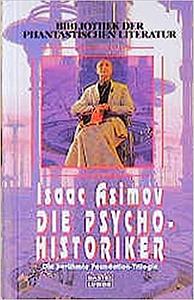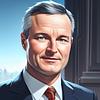You need to sign in or sign up before continuing.
Take a photo of a barcode or cover
I was thinking about this trilogy...I read it in the late 80s, early 90's and could not put it down. I am not a huge science fiction buff but appreciate it when it is GOOD. This would be worth a re-read to see if I still love it as much as I remember.
I read this series with my mother many years ago. Even then I found it not just captivating but mentally stimulating. It's amazing how good science-fiction always manages to do 3 things:
1. Entertain - it's still fiction and should be engaging to read.
2. Predict the future - great sci-fi always seems to have a glimpse of what's coming. Asimov and his world of robotics has this moreso than most.
3. Inspire imagination - sci-fi has a way of sending the mind down a road of infinite possibilities.
1. Entertain - it's still fiction and should be engaging to read.
2. Predict the future - great sci-fi always seems to have a glimpse of what's coming. Asimov and his world of robotics has this moreso than most.
3. Inspire imagination - sci-fi has a way of sending the mind down a road of infinite possibilities.
This was a great read. The first book is a clear analogy to the history of Europe from the end of the Roman Empire through the Renaissance, just presented as a space opera. I really enjoyed being able to see through the allegory into the history behind Asimov's ideas and the ways that history and historical forces affects us. His concept of psychohistory is so well developed and logical I'm amazed that no one has started studying it at universities.
As for the story, the organization could be a little disorienting, as portions of the book shift the timeline centuries into the future with little warning, but it effectively tells the story of the main character in the books, the titular Foundation, rather than focusing on individual actors in the moment. That being said, each of the human characters is fully realized and motivated by clear goals as the read moves through their part in the story.
I really enjoyed the books and would recommend them to anyone looking to read some sci-fi with a historical bent.
adventurous
informative
mysterious
medium-paced
Plot or Character Driven:
Plot
Strong character development:
No
Loveable characters:
Yes
Diverse cast of characters:
N/A
Flaws of characters a main focus:
No
adventurous
mysterious
slow-paced
Plot or Character Driven:
Character
Strong character development:
No
Loveable characters:
Complicated
Diverse cast of characters:
Yes
Flaws of characters a main focus:
No
I just couldn’t get through it. Finish the first and got halfway through the second of the trilogy but it just wasn’t compelling enough for me.
All 3 books are excellent! I enjoyed “Second Foundation” the most, followed by “Foundation and Empire”, and lastly “Foundation”. The trilogy ends well and let’s you imagine what could happen after “Second Foundation” but it also leaves you wanting to read the rest of the books that Asimov later wrote to conclude the story of the Foundation. Whatever choice you decide I’m sure Asimov makes it fantastic.
Cada libro de la trilogía es mejor que la anterior, pero tiene muchas cosas que no me gustan, como la lógica ausencia de personajes principales con los que conectar. Claro que, luego llega el Mulo y la cosa mejora mucho. A pesar de todo, quitando el giro dentro del giro dentro del giro del final, pude ver venir todas las sorpresas (es lo que pasa por tener pocos personajes, que los lectores un poco intuitivos ya pueden saber quién es el culpable solo por eliminación).
No sé si la trilogía de la fundación es un buen ejemplo de ciencia ficción, pero la verdad es que apenas he visto diferencias con la fantasía. Sí, cambiamos la ambientación, la escala y metemos un poco más de explicaciones, pero como al final simplifica todo para que el lector medio lo entienda, no veo diferencia con una novela fantástica media que se dedique a desarrollar la premisa principal.
Se hace un poco pesado, eso sí.
No sé si la trilogía de la fundación es un buen ejemplo de ciencia ficción, pero la verdad es que apenas he visto diferencias con la fantasía. Sí, cambiamos la ambientación, la escala y metemos un poco más de explicaciones, pero como al final simplifica todo para que el lector medio lo entienda, no veo diferencia con una novela fantástica media que se dedique a desarrollar la premisa principal.
Se hace un poco pesado, eso sí.
I remember reading this book when I was in my early teens during the hot summer of 1976 and it's one of my main memories of that time, along with bad sunburn and a long summer at Port Seaton searching for crabs in rock pools.
This was also the year I listened to 'Crisis. What Crisis?' by Supertramp.
It quickly became a firm favourite alongside a lot of other books I read at that time; Heinlein, McCaffrey, Silverberg and Frank Herbert being the main ones.
So after not reading it for over a decade I noticed that it was released as a one volume trilogy and was really looking forward to reading it once more.
I really did like the familiarity of the characters and the story, but I forgot how pedestrian it was at times and that it took a long time to build any of the arcs that ran through the book and came back as a recurring theme, but with each recurrence being a greater magnitude from the previous incident/problem.
It is nice to have a copy again in my collection, but I feel that Science Fiction has moved on from the early years and that for good storytelling in the Space Opera genre Neal Asher is one of my favourite authors at this time.
A must have book if you are interested in the development of Science Fiction writing in the 40s and 50s and this is a great example by one of the early masters of the genre.
This was also the year I listened to 'Crisis. What Crisis?' by Supertramp.
It quickly became a firm favourite alongside a lot of other books I read at that time; Heinlein, McCaffrey, Silverberg and Frank Herbert being the main ones.
So after not reading it for over a decade I noticed that it was released as a one volume trilogy and was really looking forward to reading it once more.
I really did like the familiarity of the characters and the story, but I forgot how pedestrian it was at times and that it took a long time to build any of the arcs that ran through the book and came back as a recurring theme, but with each recurrence being a greater magnitude from the previous incident/problem.
It is nice to have a copy again in my collection, but I feel that Science Fiction has moved on from the early years and that for good storytelling in the Space Opera genre Neal Asher is one of my favourite authors at this time.
A must have book if you are interested in the development of Science Fiction writing in the 40s and 50s and this is a great example by one of the early masters of the genre.






